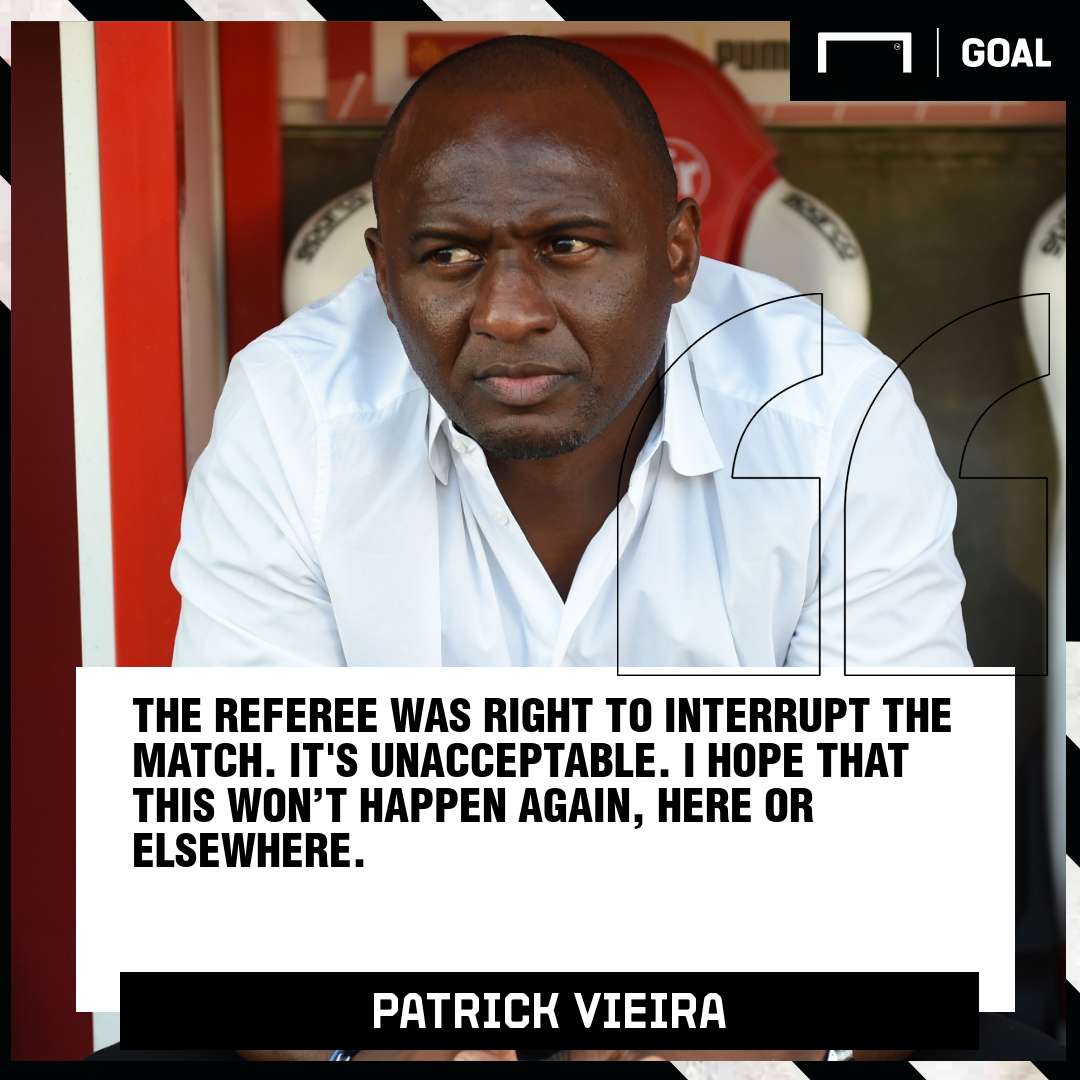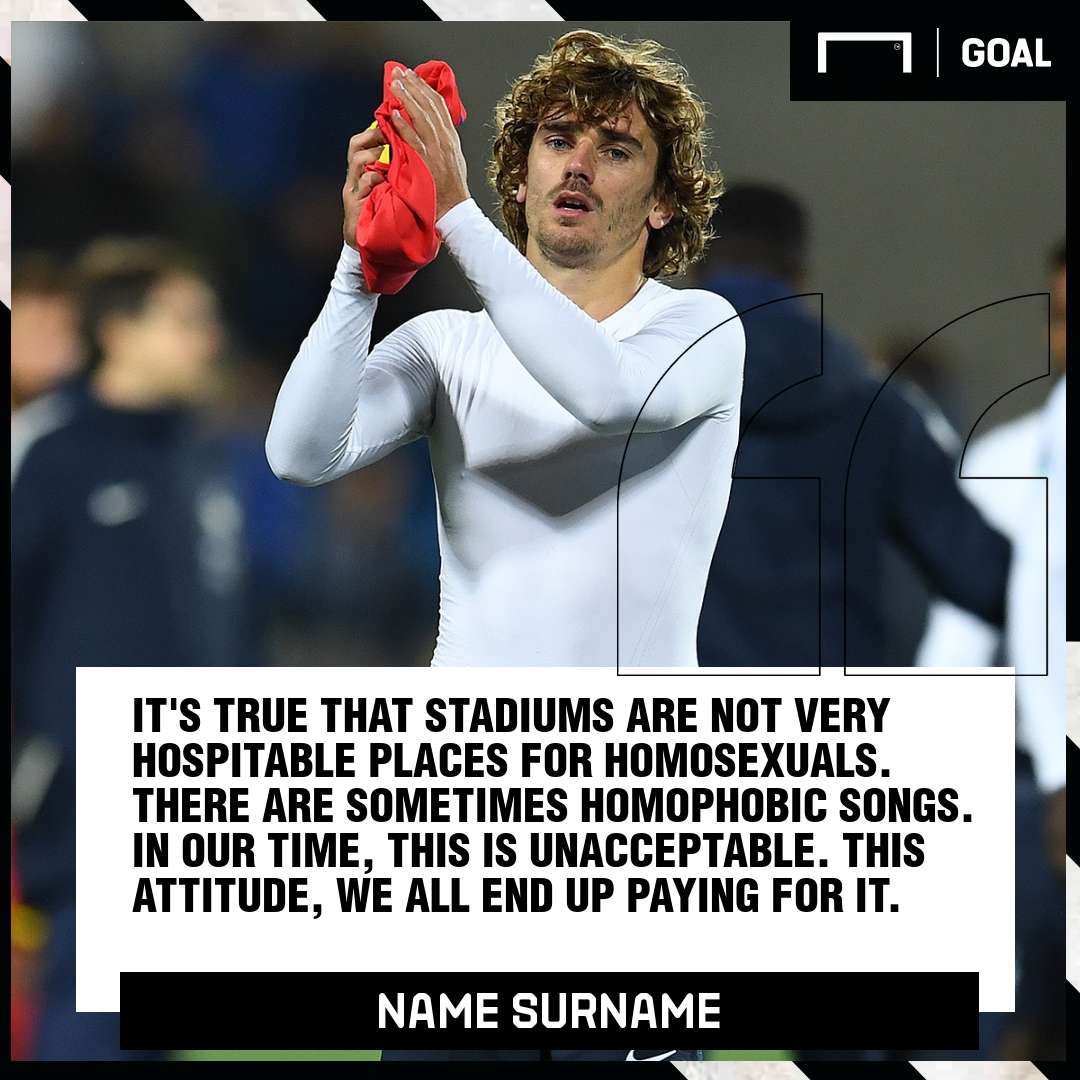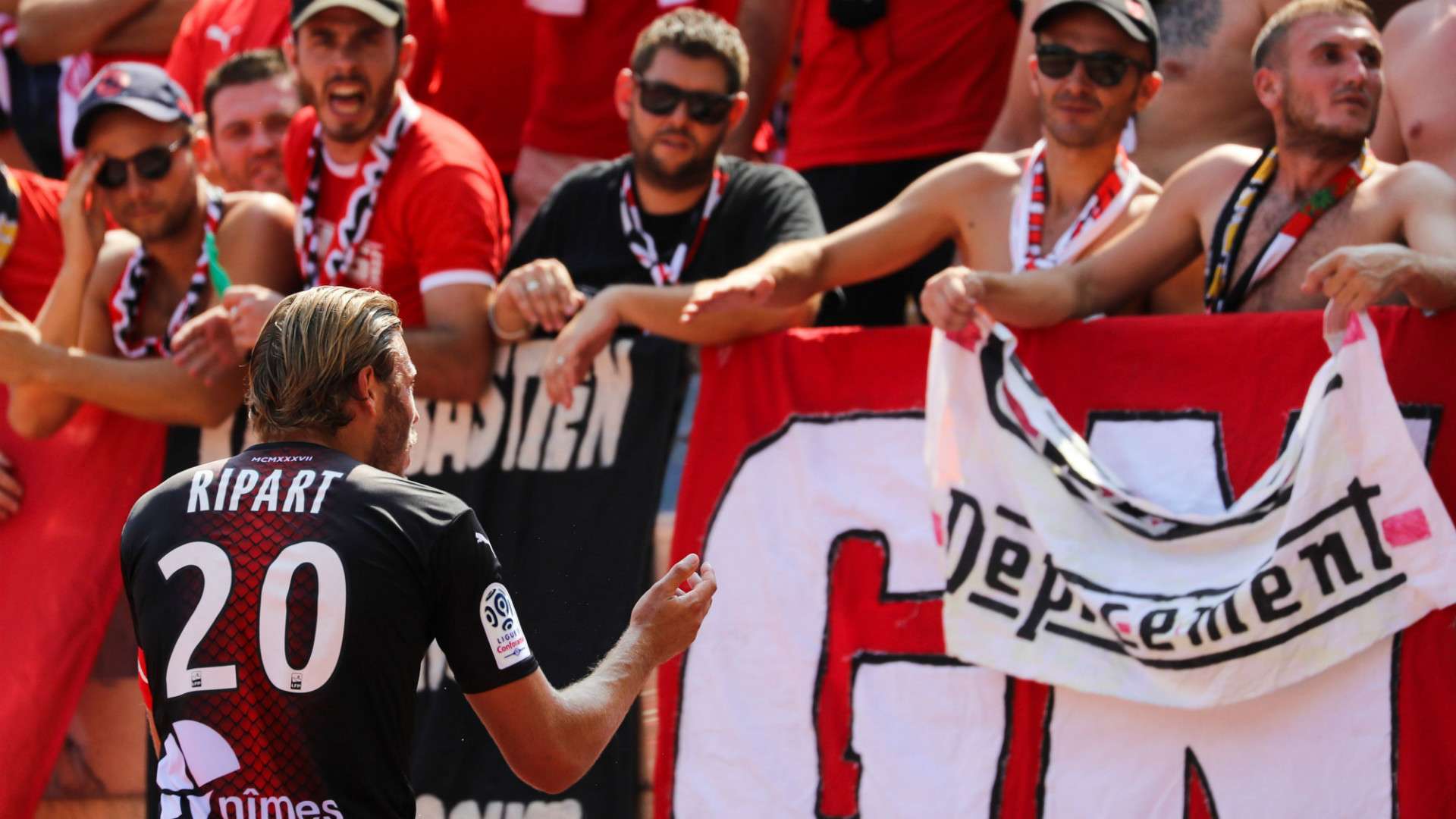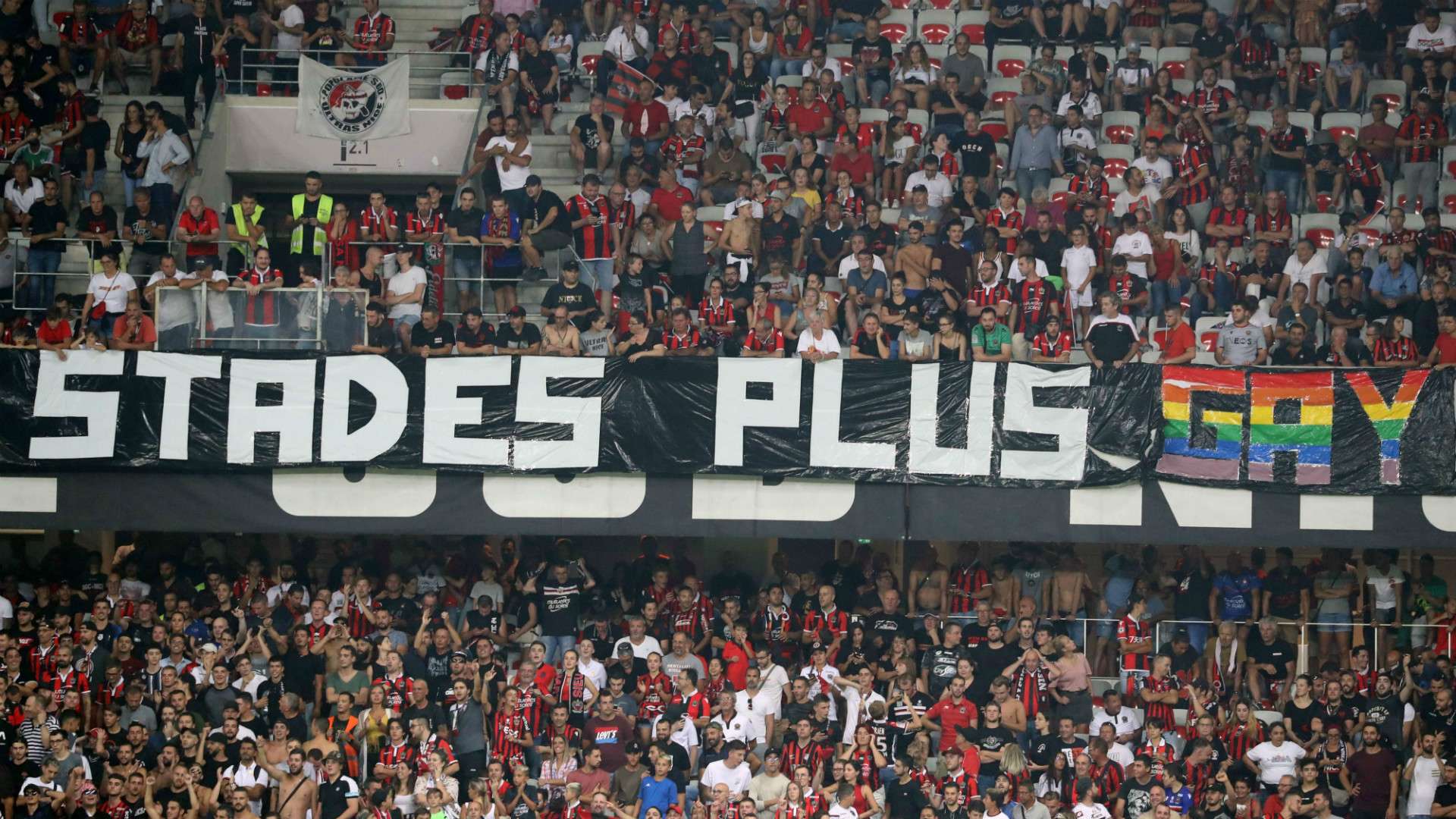French football’s fight against homophobia went worldwide on Wednesday as Nice’s 2-1 loss to Marseille at the Allianz Riviera became the most high-profile game to date to be suspended because of displays of intolerance from certain sections of the crowd.
Midway through the opening period, the home supporters unveiled three offensive banners in succession, prompting referee Clement Turpin to enter into a discussion with the match delegate.
After a brief stoppage following the first sarcastic banner, the players were ordered off the field for 10 minutes when a second, cruder, message was displayed.
“The referee was right to interrupt the match,” Nice boss Patrick Vieira said afterwards. “It’s unacceptable. The message has been clear and the referee had no choice.
"Maybe he could have given us a little more time to go to see the supporters and ask them to remove the banners. But I hope that this won’t happen again, here or elsewhere.”
The former France and Arsenal midfielder is set to be disappointed.
Since referees were instructed to clamp down on displays of homophobia at French football grounds amid a general drive in France to tackle intolerance, a string of matches have been halted, beginning with Nancy’s encounter with Le Mans in Ligue 2 on August 16.
Referee Mehdi Mokhtari won widespread praise for being the first to act.
“I wish to extend my congratulations to referee Mokhtari and the delegate of the LFP, Alain Marseille, who took their responsibilities and decided to halt the match between Nancy and Le Mans for homophobic insults," Minister of Sports Roxana Maracineaunu wrote on Twitter.
"It’s a first. And a last – I hope.”
Sadly, several fixtures have since been interrupted because of the new zero-tolerance approach, including those between Nimes and Nice, Angers and Metz, and Nimes and Monaco last weekend.

At other games, however, a blind eye has been turned to homophobic insults, while no game has yet been called off – even though referees have been asked to employ postponement as a third-strike measure against non-compliant fans.
Homophobia has been an issue within the French game for some time.
Indeed, World Cup winner Antoine Griezmann – the closest thing France has to the equivalent of the ‘all-American hero’ – addressed the problem during an interview with gay magazine Tetu in May.
“Homophobia is not an opinion, but a crime," the forward stated. "And now if a player makes homophobic remarks on the pitch, I think I’ll stop playing the match. Because it has to change.
"It's true that stadiums are not very hospitable places for homosexuals. There are sometimes homophobic songs. In our time, this is unacceptable. This attitude, we all end up paying for it.”
The controversy has primarily arisen because of the use of the word 'enculer' – which roughly translates as 'go f*ck yourself up the a*se' – in a chant typically heard all over France that takes aim at whichever person or group happens to be the target of their ire.
In Nancy’s case, that is local rivals Metz, and club president Jean-Michel Roussier believes that they were an easy target for authorities looking to make an early statement of intent.
"We feel like a scapegoat, the magnitude of the event seems excessive to me,” he complained.
Meanwhile, prominent Nancy supporter Jean-Michel Goncalves wondered to L’Equipe: “Why are we being singled out today when we’ve been singing this song for 20 years?
"We’ve nothing against homosexuals. When you insult Metz, it’s more for tradition.”
 Getty/Goal
Getty/Goal
Similarly, security officials at Marseille, who will meet with fans to discuss the issue, are concerned that a rapid change of approach from referees will be difficult to replicate in terms of supporters’ attitudes.
“Some expressions have been part of the language of Marseille for a long time,” one unnamed source within the club told L’Equipe. “It’s a sociological problem. We need education well before fans get to the stadium.”
Fans are being asked to find more imaginative and less offensive ways to insult their traditional rivals, but it comes amid a climate of discontent in the stands in which ultras groups feel that they are being targeted for all the ills in the game.
Saint-Etienne’s banners before their opening home match of the season against Brest summed up the mood of fans around the country, who see potential new legislation to allow them to drink beer in the stands as a peace offering.
In a series of six banners, Sainte’s ultras outlined their discontent with the authorities: “MD1. Banned from going into the centre of Dijon.
“MD2. A stand is shut.
“MD3. Match pushed back to Wednesday.
“MD4. Fans are not allowed to go to Marseille.
“So, it’s not for beer that we care… We especially thirst for freedom.”
 Getty Images
Getty Images
Four groups of fans were not allowed to travel to support their sides on matchday two of the Ligue 1 season, and this is not an atypical occurrence; by the end of the 2018-19 season, such restrictions had been put in place more than 600 times in nine years.
“It’s house arrest,” Greg Massabo, a spokesperson for Nice’s Populaire Sud told France Bleu on that particular weekend. “We’re treated more severely than wanted criminals. If we were gangsters or thugs, I would understand these measures, but I’m a father with a job – I just want to support my club.”
Nice published an official statement condemning this ban and Vieira also spoke out against it, stating: “It annoys me because it happens quite often. It’s a lot easier to give a ban to everyone than to have plans to control the few troublemakers. And I think football loses there.”
In this context, opening up another battlefront against a group that already feels victimised – and in some cases justly – is likely to only fuel discontent against the authorities and, as such, is unlikely to have the immediate impact that the powers that be desire.
Fans, however, have a responsibility to recognise that their fight for the right to travel freely on matchdays is nothing compared to the homosexual struggle for acceptance within football.
As Wednesday’s drama was playing out in Nice, the LFP was busy announcing that Nancy would have a stand closed because of the “discriminatory chants” that had plagued their match against Le Mans, highlighting the zero-tolerance attitude that is now present.
To that end, France is leading the fight against homophobia in football as the third decade of the 21st century dawns.
However, in order to secure a quicker victory they would be advised to treat every fan with the respect that they deserve.




